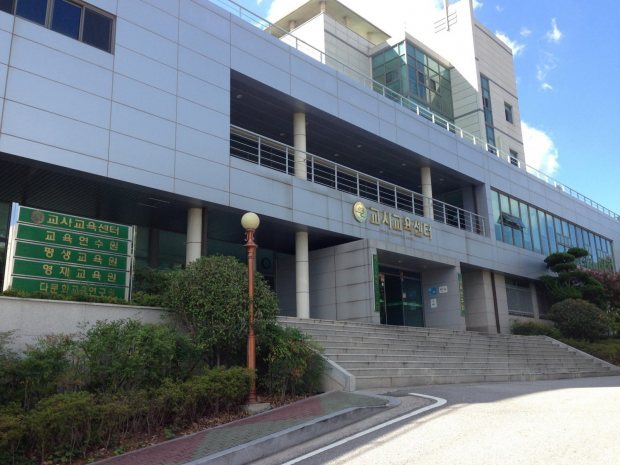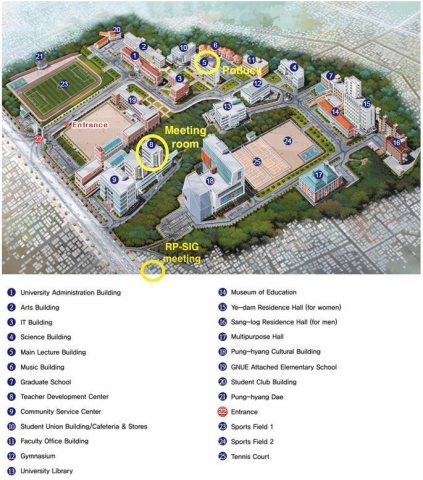
Gwangju-Jeonnam Chapter July Meeting
.
––– Morning Reflective Practice Session –––
Topic: Reflecting on Cultivating Emotional Resilience
Facilitator: Vanessa Virgiel (Framingham State University)
Time: July 13, 2019; 11:00 - 12:30 (2nd Saturday)
Location: Coffee Lab Mujii, near GNUE. (Ground floor of 광주우리교회 Building. Map at bottom.)
––– MAIN MEETING SCHEDULE –––
Time: 2nd Saturday, July 13, 2019, 1:45ㅡ5:00 pm
Location: Gwangju National University of Education (GNUE), Teacher Training Center (교사교육센터) 1st Floor; Room 812 (Room Change). Detailed directions HERE.
1:45 pm: Sign-in and Meet-and-Greet (Admission: Free for newcomers. Membership welcomed.)
2:00ㅡ2:50 pm: Presentation 1
ㅡ Topic: Code-Switching: Assist or Avoid
ㅡ Presenter: Bryan Alkema
2:50ㅡ3:10 pm: Refreshment Break
3:10ㅡ4:00 pm: Presentation 2
ㅡ Topic: Online Language Learning Should Be Easy and Free, But It’s Not (Yet)
ㅡ Presenter: Daniel Corks (Woosong University, Daejeon)
4:10ㅡ4:45 pm: SwapShop Mini-Presentations
Share your Teaching Ideas, Classroom Activities, and Teaching Wisdom with the group.
(Everyone is encouraged to share [up to 5-6 min. each]. Short tidbits are welcomed. Handouts also welcomed.)
4:45 - 5:00 pm: Announcements / Drawing for Door Prizes / Closing
Session Summaries
Code-Switching: Assist or Avoid
Bryan Alkema
That moment when you know you’ve heard the other language in an English classroom, you turn around and see all your students blinking innocently at you….it happens to all of us. But is there any way in which not using English can be put to good use in the classroom? Code-switching is shifting between different languages within one interaction. In a second-language learning environment, what are some purposes for code-switching? As second-language teachers, what sort of responses can we develop that won’t frustrate either us or our students? We’ll examine how first language can be used to either assist or avoid the second-language learning process, and how being intentional in what we do and don’t allow can streamline our classes.
The Presenter

Bryan Alkema has taught both EFL and ESL to students of all ages and skill levels, in contexts ranging from North America to the Middle East and Asia. He has given presentations at previous national and international KOTESOL conferences, as well as in Oman. He received his M.App.Ling. from the University of Southern Queensland in 2013. He currently teaches both English and TESOL courses at Handong Global University in Pohang, Gyeongsanbukdo, and serves as coordinator for the EAP level of Handong’s four-tier English program. Email: bryan@handong.edu.
_________________________
Online Language Learning Should Be Easy and Free, But It’s Not (Yet)
Daniel Corks
The term is over, but some of your students want to continue learning English on their own time. What do you tell them? Teachers likely have a few well-meaning answers they give regarding approaches to language learning or resources for practice, such as, “Focus on meaning” or “Try graded readers”. Unfortunately, most of it isn’t concrete or specific enough to be of much use, and learners leave the class without a clear sense of what they should do next.
In today's online world, someone with time and an internet connection can learn anything for free. This is true in principle for English as well, and students who are intermediate level or above often know how to find material that suits their level and interests. For lower-level students, e.g. the typical university student, however, the picture is much different. Resources that these learners can and actually would use independently are hard to find. Online content that is at their level is buried deep within websites that are directed at teachers, not at learners, and more often than not, the material itself just feels like another textbook. There's a knowledge gap to fill on both the part of the teachers and the learners.
To fill this gap, this workshop will present an extensive list of websites, apps, social media channels, and other online resources suitable for lower-level learners and invite participants to share their own recommendations as well. Participants will also discuss and compile a simple set of language learning principles to guide students who are engaged in independent language practice.
While intended for teachers of learners who are mature enough to engage in self-study, the resources presented in this presentation can also be easily put to use by teachers in class.
The Presenter

Daniel Corks is a graduate of Sogang University in Seoul with a master‘s degree in applied linguistics in the area of second language acquisition. He is currently an assistant professor at Woosong University in Daejeon and a member of the Daejeon-Chungcheong Chapter of KOTESOL. Prior to this, Daniel was based in Jeollanam-do and was active in presenting and participating at Gwangju-Jeonnam Chapter events.
____________________
Reflective Practive Session
Reflecting on Cultivating Emotional Resilience
.
Vanessa Virgiel
Based on Elena Aguilar's conceptual framework for emotional resiliency, we'll use a strengths-based approach to explore the ways our own personal attributes, values, and purpose in teaching help make us resilient and manage the stresses involved in being an educator.
Photo: The Gwangju National University of Education (GNUE / 광주교육대학교), Teacher Training Center (교사교육센터), venue for our main meeting ㅡ 1st floor, Room 812.






